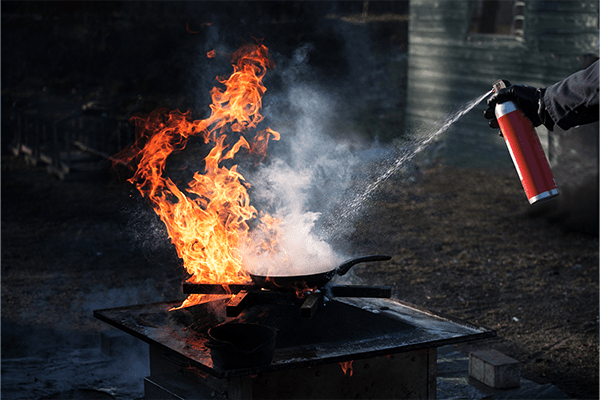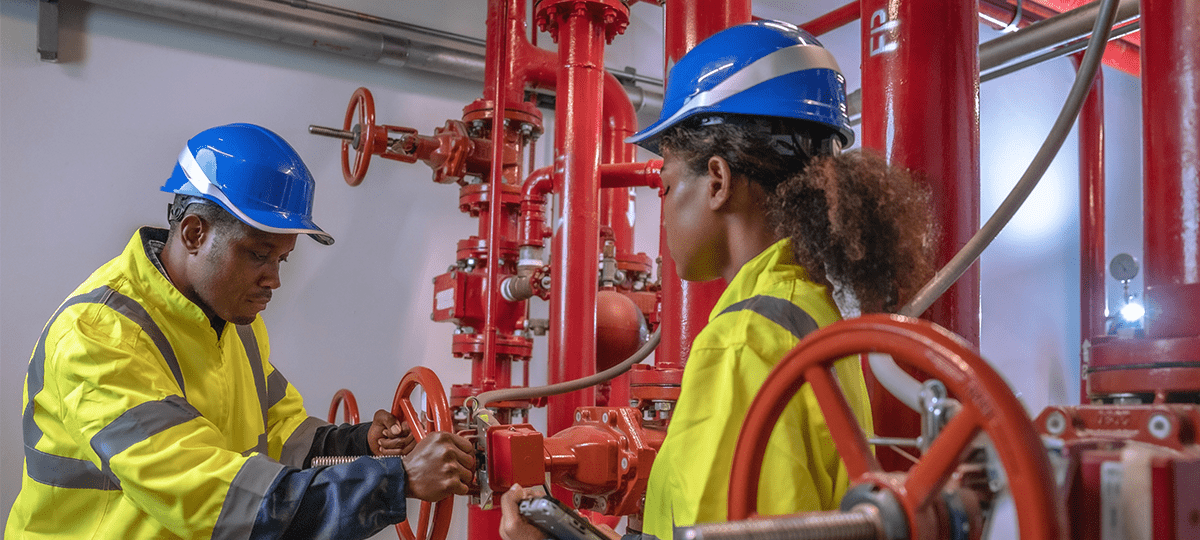What Are the 5 Classes of Fires?
While it can be hard to tell the difference at first glance, different types of fires occur based on the materials that fuel them. Just as you wouldn’t try to put out a grease fire with water, specific ways to extinguish each fire class exist and depend on what sustains it. Some atypical classes of fires are more common in commercial settings, and it’s critical to know each class to accurately identify fires and then use the appropriate fire extinguishers.
The National Fire Protection Association (NFPA) has guidelines for what each fire class includes and identifies what fire extinguishers can be used to put out each class. Here are the NFPA’s different fire classes and each type’s corresponding fire extinguisher.
What is a Class A fire?
A Class A fire occurs with ordinary combustible materials that you’d find in a typical business or residence. Of the five types of fires, these are the most common type and occur more frequently. Because these solids are usually abundant in any commercial or residential setting, they can create and sustain more intense fires that spread and worsen quickly.
Materials that fuel Class A fires include:
- Wood
- Cloth
- Paper
- Rubber
- Plastics
Because Class A fires often depend on more everyday solid materials, they are usually less complicated to extinguish. Water is a standard liquid used in Class A fire extinguishers, with the occasional additive of other chemicals. Foam, wet or dry chemicals, or clean agents are also used to extinguish Class A fires in environments that would suffer additional damage from water.
What is a Class B fire?
Class B fires rely on combustible and flammable liquids and gases. While they can occur in businesses and industrial settings that often work with these liquids, homes and other residential environments are also susceptible. A Class B fire can burn at most temperatures when exposed to a fire source because of its low flashpoint, and it often spreads quickly and produces thick black smoke.
Substances involved in Class B fires include:
- Alcohol
- Gasoline
- Oil
- Propane
- Paint
While water is commonly used to fight fires, water-based extinguishers may be ineffective against Class B fires. Fire extinguishers rated for a Class B fire often contain foam, clean agents like carbon dioxide, or dry chemicals.
What is a Class C fire?
A Class C fire fuels itself on electricity, usually from live energized electrical equipment and other electrical components. They are highly dangerous, especially when someone attempts to extinguish the fire with water. Class C fires often occur in industrial or commercial settings with lots of electrically powered equipment. Still, they can also happen in residences due to faulty wiring or other electrical issues.
Elements that can sustain a Class C fire include:
- Appliances
- Machinery
- Electric tools
- Wiring Motors
Due to electricity’s dangerous and conductive nature, Class C fires cannot be suppressed with water. Instead, a fire extinguisher with a non-conductive extinguishing agent, like dry chemicals or clean agents, must be used to douse an electrical fire while protecting whoever fights it from being electrocuted.
What is a Class D fire?
Class D fires depend on combustible metals for fuel, so they often occur in laboratories, industrial businesses, and manufacturing facilities. When these materials are handled in processes that result in dust, shavings, or flakes, that can lead to a fire starting and spreading when ignited.
Metals that can fuel a Class D fire include:
- Magnesium
- Sodium
- Lithium
- Aluminum
- Titanium
Water and other commonly used extinguishing agents are typically ineffective against Class D fires. Using water to extinguish the flames can make them more intense and dangerous. Instead, an extinguisher that contains dry powder chemicals must be used to subdue a Class D fire.
What is a Class K fire?
A Class K fire occurs when grease or cooking-related combustible materials ignite in a kitchen setting, so it’s common in restaurants or commercial-sized kitchens. While they’re more prevalent in commercial settings, Class K fires can happen in residences where grease or other combustible substances catch fire.
Cooking ingredients involved in a Class K fire include:
- Grease
- Oil
- Cooking fat
Because water can worsen them, Class K fires must be treated with wet chemicals to suppress and cool them. Class K fire extinguishers commonly use wet chemical agents that contain potassium or other alkaline mixtures to create a foamy layer that extinguishes fire.
Identifying which fire classes pose the greatest threat to your business is more challenging than it seems, and ensuring you’re equipped with the proper fire extinguishers for each class is another layer of difficulty that puts your employees and customers at risk. With FSS Technologies, you can rest assured knowing your business is prepared for the worst. Our FSS service technicians can assess your building’s fire ratings, develop a comprehensive plan for a fire alarm system, and implement the proper prevention, protection, and suppression elements. Contact us today to get started.











